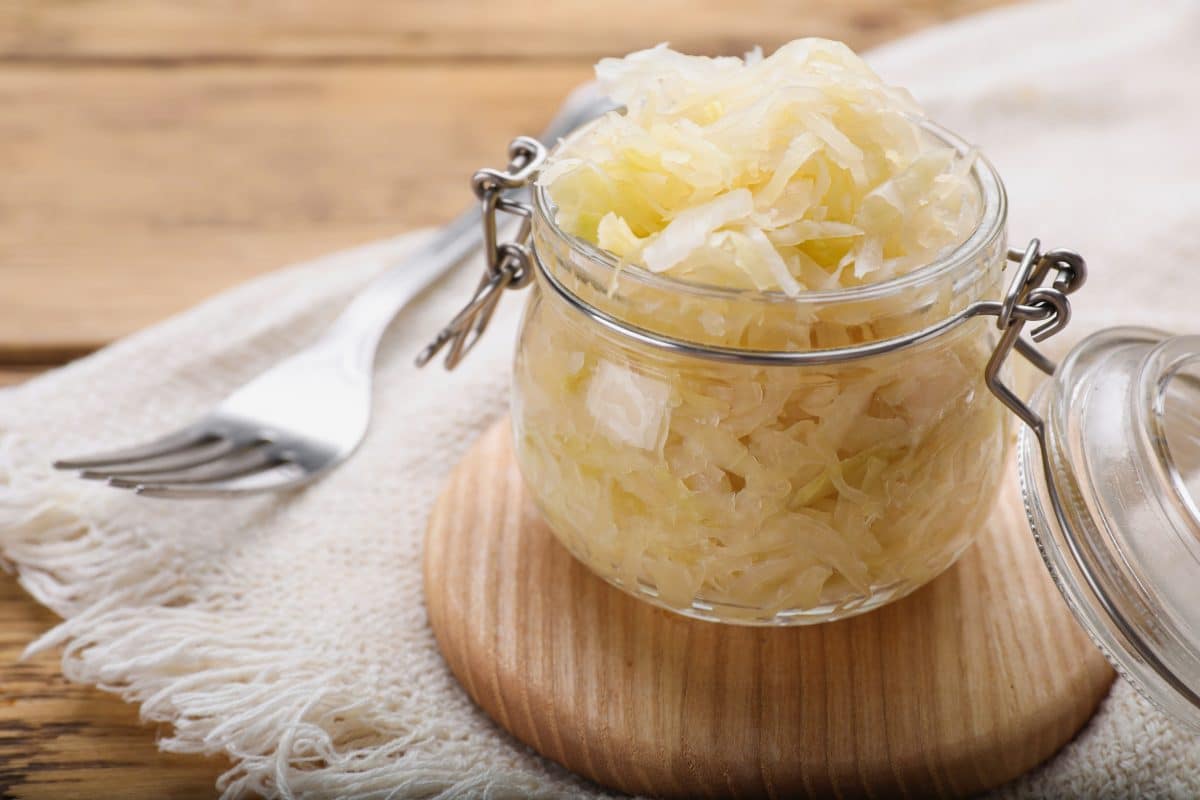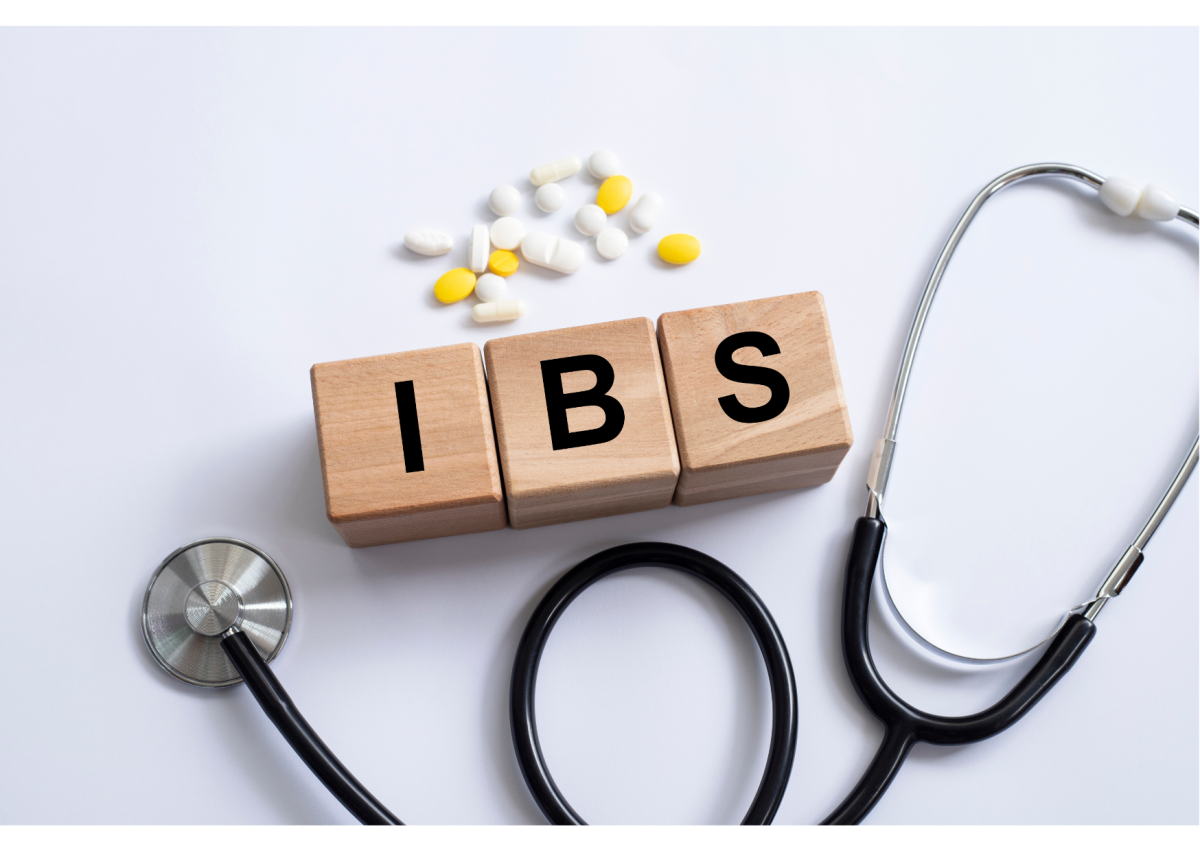Sauerkraut for IBS ー does it help?
- Dietary Advice (non Low FODMAP)
Do you wonder if sauerkraut for IBS is a natural remedy?
This article will explain what sauerkraut is, the FODMAP content of sauerkraut and whether it can help IBS or not.
Moreover, we will explain the role of other fermented foods for IBS and check what science says about it.

What is sauerkraut?
Sauerkraut is fermented cabbage. Food manufacturers prepare sauerkraut by shredding the cabbage, layering it with salt, and then allowing it to ferment.
The fermentation process (with lactic bacteria) produces a sour and preserved vegetable that can be stored for several months.
Sauerkraut is a staple in German and Eastern European dishes. Usually, it serves as a side dish, in sandwiches, or as a topping.
Is sauerkraut low FODMAP?
No, traditional sauerkraut from white cabbage is high FODMAP due to the fermentation process when bacteria break down sugar from fresh cabbage into mannitol (1).
However, you can include it in your diet in small quantities that are still low FODMAP, up to 23g per sitting (roughly two tablespoons) (1).
On the other hand, sauerkraut from red cabbage is low FODMAP up to 75g. Larger quantities may trigger IBS symptoms due to a type of FODMAP fructan (1).
To learn about low FODMAP portions of fresh cabbage, read the article: Is cabbage low FODMAP?
Is sauerkraut good for IBS?
Sauerkraut is high FODMAP, a potential IBS trigger.
However, there is a hypothesis that the lactic bacteria from fermented cabbage could positively impact the gut microbiota of IBS patients and improve symptoms.
So, let’s take a look at what science says about it.
A 2018 study followed two groups of people with IBS. Both groups consumed 75g of sauerkraut daily. One group ate pasteurized, and the other group unpasteurized sauerkraut (2).
After six weeks of eating sauerkraut both groups reported improvements in their symptoms (2).
Although this study sounds promising in favor of sauerkraut for IBS, it has a few limitations.
The first limitation is the small sample of participants—only 34 people from both groups completed the intervention. A larger sample would give more representative and reliable results.
Another limitation of the study is the absence of a control group, also known as a placebo group. Therefore, we do not know how participants’ expectations impacted the results.
A huge limitation is also the dropout of participants, as some of them dropped out due to worsening symptoms. If they had completed the trial, the results would probably be different.
Knowing that, sauerkraut is probably not the magic remedy for IBS.
If you are curious about science-backed natural remedies for IBS, read our article: 11 ways to treat IBS naturally.

Fermented foods and IBS
There are speculations that fermented foods are beneficial for IBS as they can positively impact gut microbiota, which is altered in people with IBS.
Fermented foods contain live bacteria, but we do not know how many arrive alive in the intestines. This is why fermented foods are not the same as probiotics for IBS.
A 2022 study showed the positive effect of eating kimchi daily on IBS symptoms. The outcomes were due to participants’ increased fiber intake (3).
Learn more about kimchi and IBS here: Is kimchi low FODMAP?
You would probably want to know if kefir is also beneficial for IBS. Unfortunately, we do not have the evidence to claim it. To read more about kefir and IBS, read the article: Will kefir help IBS?
Another fermented food is sourdough bread. Microbes ferment FODMAPs from wheat, making it easier for patients with IBS to digest.
Sourdough is, therefore, not a remedy for IBS, but replacing regular bread with sourdough can be helpful as it will not trigger symptoms in people sensitive to fructans (a type of FODMAP).
Summary
Sauerkraut is fermented cabbage, and there are many claims that it could help IBS (primarily due to lactic acid bacteria).
The science does not support this claim as digestion (stomach acid, bile salts) probably kills off the bacteria, but eating sauerkraut can help you increase fiber intake.
However, sauerkraut is low FODMAP, up to 23g, and as the safe portion is relatively small, a larger portion size is a potential IBS trigger.
Other fermented foods, such as kimchi, are associated with improved symptoms due to increased fiber intake.
Another interesting food is sourdough – microbes break down FODMAPs from wheat and make it IBS-friendly.
If you like the taste of fermented foods, include them in low FODMAP portion sizes as that can help increase your diet’s diversity.
However, fermented foods are not a remedy to solve all your gut issues (but working with a registered dietitian might).
Written by Barbara Lešnik, Student Dietitian, reviewed by Kirsten Jackson, Consultant Dietitian BSc Hons, RD, PG Cert